You might be wondering when your new puppy will start to calm down if he is currently running around the house like a lunatic. In order to answer the question of when puppies settle down, we will take a closer look at some of the most important variables.
It can seem as though a puppy has endless energy. However, it could also mean that they are constantly causing trouble, destroying your property, destroying your garden, and generally making you a little crazy.
Although a furry little ball of fury may be adorable, you have probably found yourself wondering when your puppy will calm down.
There isn’t a single, universal solution. However, we need to talk about all the factors that affect a pup’s energy levels in order to explain when puppies will start to calm down.
Is It Normal for Puppies to Have a Lot of Energy?
Yes! Puppies are curious creatures that want to explore the world and determine their boundaries, just like babies.
Every day they are learning, whether it be by zipping around the room to explore their new surroundings or using their mouths to examine anything they can get their paws on (which, more often than not, might include your trainers!).
The breed, gender, and social structure of your dog, among other things, can affect how energetic they are.
When Do Puppies Start to Calm Down?
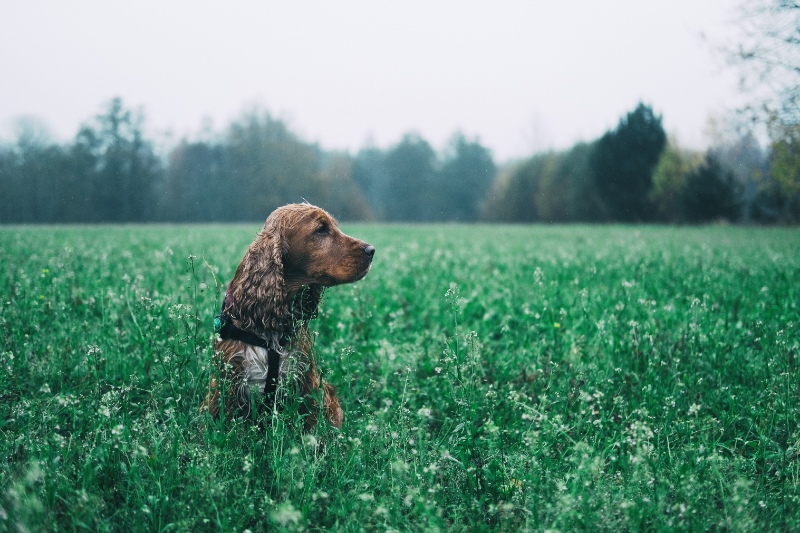
Most puppies start to calm down as they approach their maturity age, which is usually around 12 months, but for larger breeds, it can be more likely to occur between 18 months and 2 years.
You can safely say that you have made it through puppyhood at this stage in a dog’s life because they will have picked up the social cues.
Factors That Affect When Puppies Start to Calm Down
Since there are many variables that affect how much energy your puppy has, including his unique personality, age, breed, and how much exercise he gets each day, all puppies don’t settle down at the same time.
Breed of the Dog
Dog breeds are more than just variations in body type and coat color. For specific tasks like hunting or retrieving prey, many dog breeds were developed.
Spend an afternoon at a dog park if you are considering getting a puppy but are concerned about all that bottled-up puppy energy. You’ll be able to tell which dog breeds are more mellow and which are more naturally spirited. When your puppy eventually calms down, you’ll have a better idea of how they’ll act from then on.
A Fluffy Frenchie and a Sable German Shepherd, for instance, will have very different levels of energy.
Some breeds with notably high energy levels, even in adulthood, include:
- Dachshunds
- Terriers
- Greyhounds
Personality
Although it’s not the only factor, breeding has a big impact on when your puppy starts to calm down.
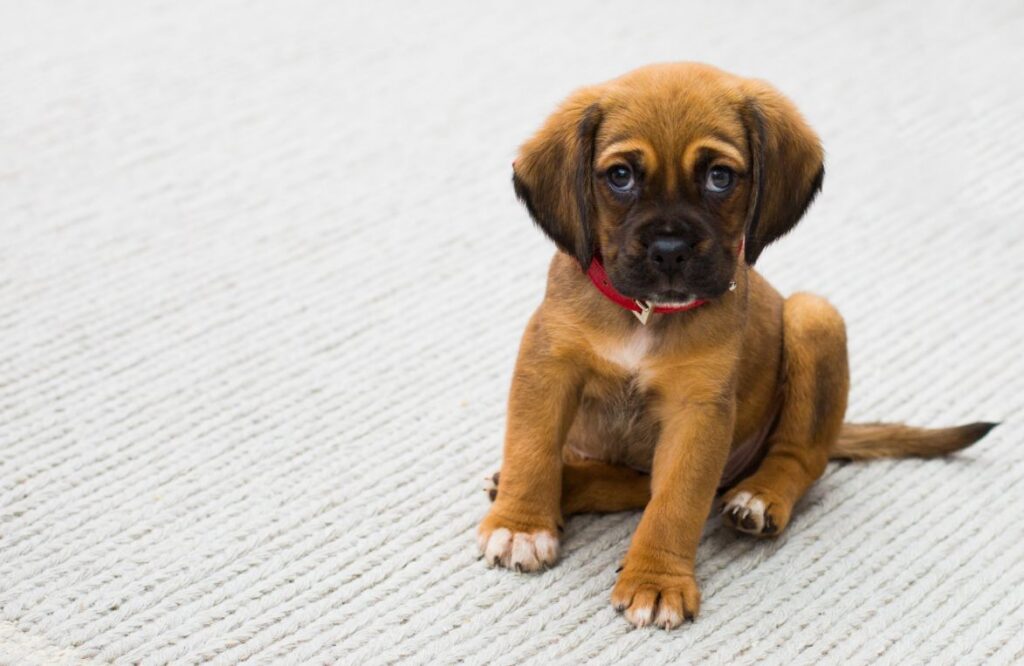
Dogs have personalities, just like people. And just like people, some dogs are friendlier than others. One of our two dogs welcomes visitors through the front door. The other doesn’t care about strangers as long as he can find a cozy place to sleep.
Your puppy’s personality cannot be predicted in advance. However, a reputable breeder should be able to tell which of their puppies have which personalities, and they can assist you in picking a dog that will get along with you and your household.
Gender
Although it can affect when your puppy settles down, gender is more related to when your puppy stops growing. Females typically reach their full size before males do.
Also, as we previously discussed, when a puppy stops growing, they usually become calmer. In this way, female puppies may become more at ease and calm than male puppies. But once more, science is not an exact science!
Social Structure
Incorporate your puppy into the pack if you have older dogs. Energy outbursts might be lessened as a result. A healthy pack structure does aid in the development of your puppy because senior dogs will discipline a puppy if it misbehaves.
Joining the pack will help your pup exhibit fewer bad behaviors, especially those brought on by excessive energy. High-energy outbursts are made easier to control in this way.
The various developmental stages of a puppy must first be examined in order to fully comprehend how it matures.
Home Environment
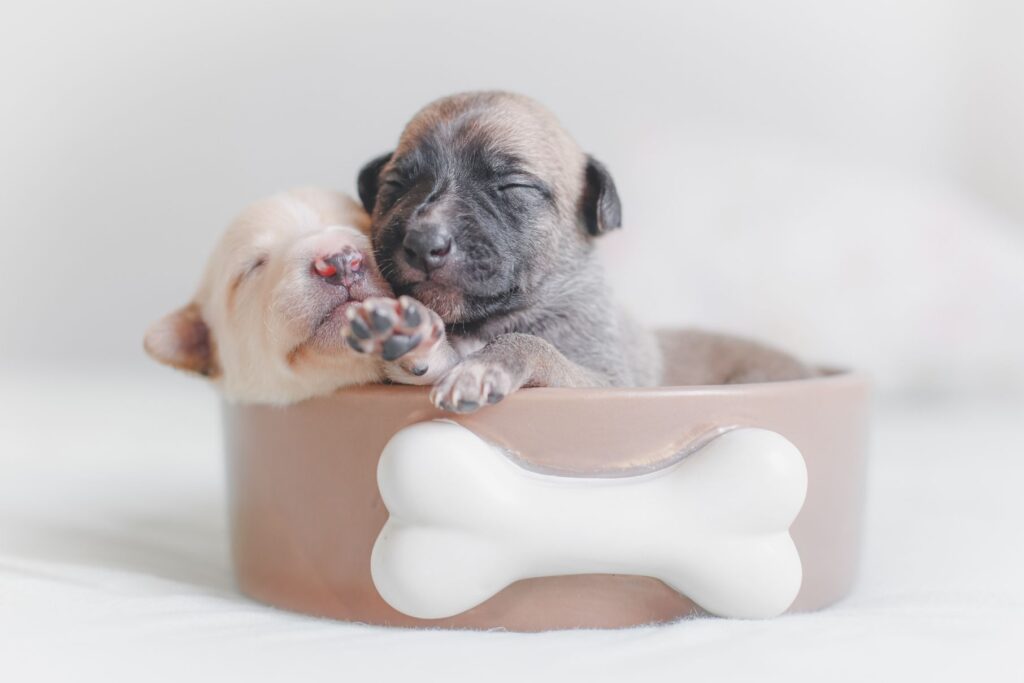
Your puppy’s home environment can influence when they will calm down, similar to how they are socialized. When pondering how your puppy’s environment at home may affect him, take into account some of these issues.
Do you live with other dogs? If so, is it a senior dog that is calmer or another boisterous puppy? Do you have kids at home?
Who resides in your house, exactly? Is each individual assisting or possibly impeding your puppy’s learning of what calm looks like?
What kind of person are you? Do you always go on adventures with your dog? Or do you prefer staying at home and lounging on the couch more?
Once more, there is no ideal solution, but your home environment may influence when your puppy will calm down.
Puppy Energy Levels by Age
Here are the energy levels you can anticipate your puppy having at various ages.
From Birth to 10 Weeks
Your puppy is much like a baby during these early stages of its life. They are curious and possess boundless energy.
The majority of their day is spent playing and learning the basic dog behaviors, such as chasing, running, pawing, biting, and fighting. It can be difficult to keep up with their enthusiasm for life and the environment, but now is the ideal time to begin planning puppy upbringing and training.
From 10 Weeks to 16 Weeks
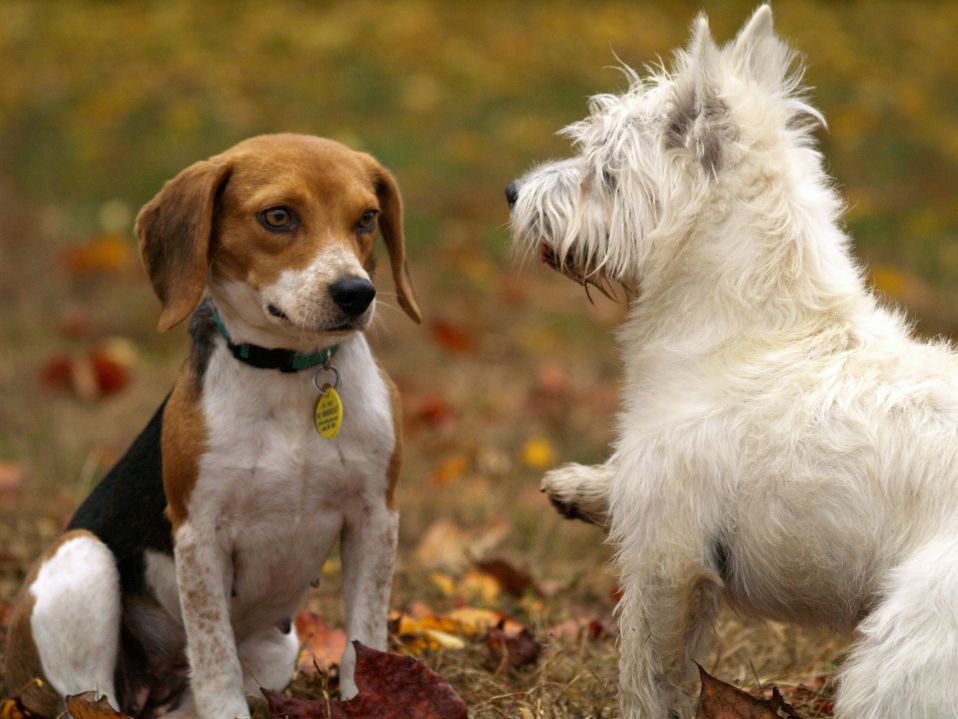
A lot of playful energy may still be present in puppies at this age. Along with that, they are beginning to push their limits. Like teenagers, they may seem to “forget” the rules or commands they once followed.
For puppies in this young stage of development, this behavior is normal. Puppy teething, which starts when they are three to four months old when they start losing their first set of teeth, maybe the cause of some of the behavior.
From 4 to 6 Months
Around this age, you might notice that your puppy enjoys playing with other dogs. Puppies use this method to determine their place in a group. This behavior is normal.
Also at this age, some puppies begin to exhibit fear. If your puppy does exhibit fear, it is best to ignore the behavior and help them gain confidence through training and rewarding experiences.
From 6 to 12 Months
Although your puppy may appear to be an adult dog at this point, he is still only a puppy. You might observe continued boundary testing at this age, as well as bursts of puppy energy.
Making sure your puppy continues to receive a lot of structured play and exercise is crucial for this reason. They must continue to receive instruction and socialization from other dogs.
From 1 to 2 Years
The puppy stage of your dog’s life is now complete. Your puppy is starting to act and look more mature as it approaches age one (up to two years for large breeds). They’ll probably still be playful, but now that they’ve gotten the hang of things, they’re much better at abiding by the rules.
How Long Do Puppies Have High Energy?
Generally, most puppies will start to settle between 6 – 12 months, but as mentioned above there are a few other factors that can impact puppy energy levels.
Some people might argue that because female dogs mature more quickly than male dogs, they are calmer dogs, but their breed is a more important consideration.
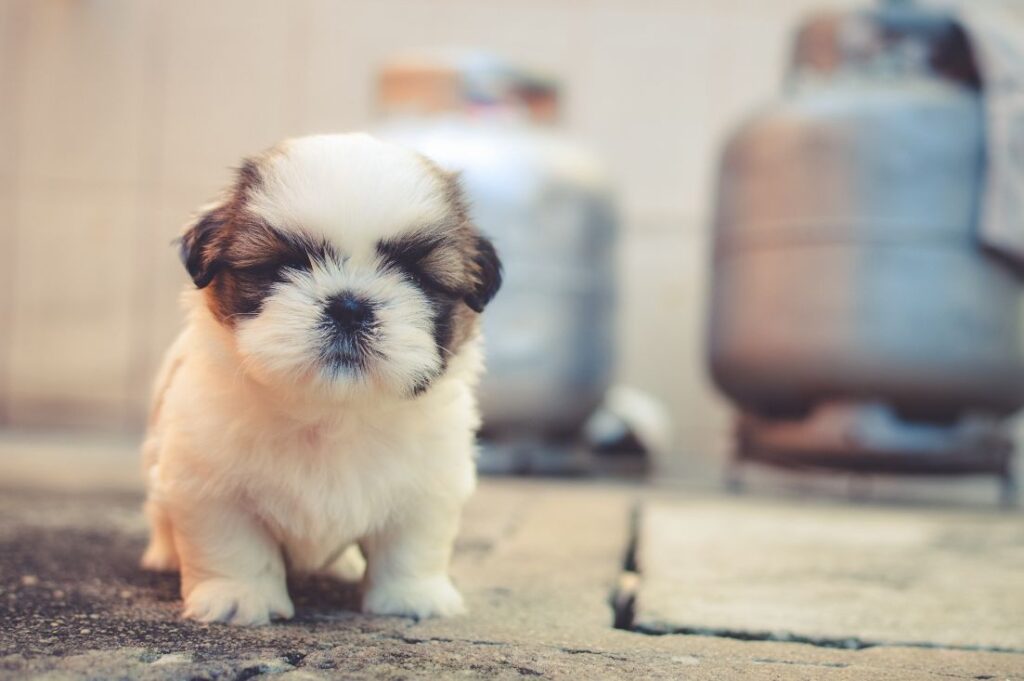
Breeds of dogs that are naturally more active, such as Border Collies and Springer Spaniels, may take up to two years to settle, and even then you will need to provide them with the exercise they require to manage their high levels of energy.
Top Tips for Calming Your Hyper Puppy
- Build a routine, the structure will help eliminate boredom, and inducing misbehaviors and may save a chair leg from being chewed!
- Channel their energy through positive outlets while you’re waiting for their vaccinations. To get their minds working, have a few play sessions with chew toys or squeaky toys and hide treats around the house.
- Enroll in a puppy training class once your pup has had its last vaccine. They will safely pick up the fundamentals of obedience with your assistance and that of a knowledgeable dog trainer, and they will begin to socialize with other puppies their own age. The combination of the two of these elements can help young dogs develop minds.
- Be patient. They will be more at ease if you maintain your composure, which we understand can be difficult at times. You run the risk of escalating the situation and reinforcing your puppy’s hyperactivity if you get upset or stressed out with it. In order to successfully navigate puppyhood, keep your breath and adopt a patient, upbeat attitude.
You may be interested in How To Leash Train, Crate Train, Potty Train, Bell Train and Clicker Train Your Puppy.
When Do Puppies Stop Biting?
Puppies can nip at you a lot, which can be one of their annoyingly high levels of energy. The reason a puppy bites will determine when he stops, but most puppies stop biting between the ages of 7 and 8 months.
If the biting is caused by teething, it should stop once the adult teeth have all erupted, which is typically completed by the age of one in most breeds.
If your puppy bites you while trying to play with you, teaching him how to play nicely will eventually stop the nipping.
If the puppy’s impulsivity is to blame for the biting behavior and the attempts to play, training and other positively reinforced “requests” for play and attention will start to reduce the behavior.
As they age, mature, and have less energy, the majority of puppies will also grow out of their biting phase.
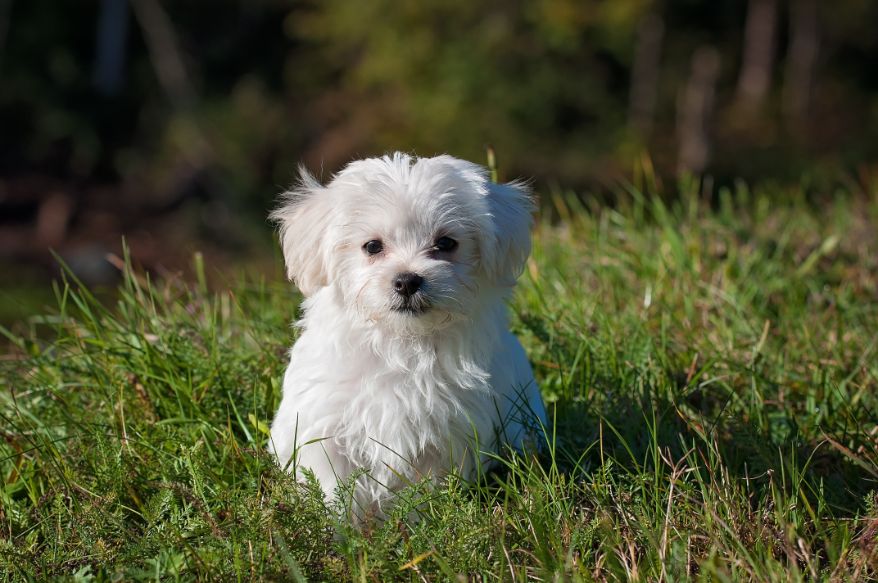
FAQs
What If My Puppy Has Too Much Energy?
Different puppies have different levels of energy, which can vary depending on the breed or the personality of the particular puppy. Making sure they engage in numerous physical activities and other activities to exhaust them mentally and physically is frequently the easiest solution.
Long walks, enrichment activities, or games of fetch could be suggested. Most importantly, train them and lay a foundation for long-term good behavior using their enthusiasm and natural curiosity. Consult your veterinarian for more specific advice if you’re worried that your puppy is being too active.
What If My Dog’s Energy Level is Low?
While some puppies are naturally more laid back than others, lethargy (low energy) can occasionally be a sign of a health problem. Lethargy may result from anything, including infection, pain, or obesity. To determine the underlying cause if your puppy appears unusually lethargic, call your veterinarian.
Conclusion for When Puppies Calm Down
When do a puppy’s emotions subside? Maturity typically begins to set in around the six-month mark and continues for the next 1.5 years.
Puppies are a lot of fun, but occasionally they have way too much energy. However, your hyper puppy will be able to calm down a little if you use these training and calming techniques.
Age is just one factor affecting your dog’s energy level, though, so it’s important to keep that in mind. They might never be at ease. However, if you keep them engaged, entertained, and stimulated, you should be able to control their destructive behavior.





